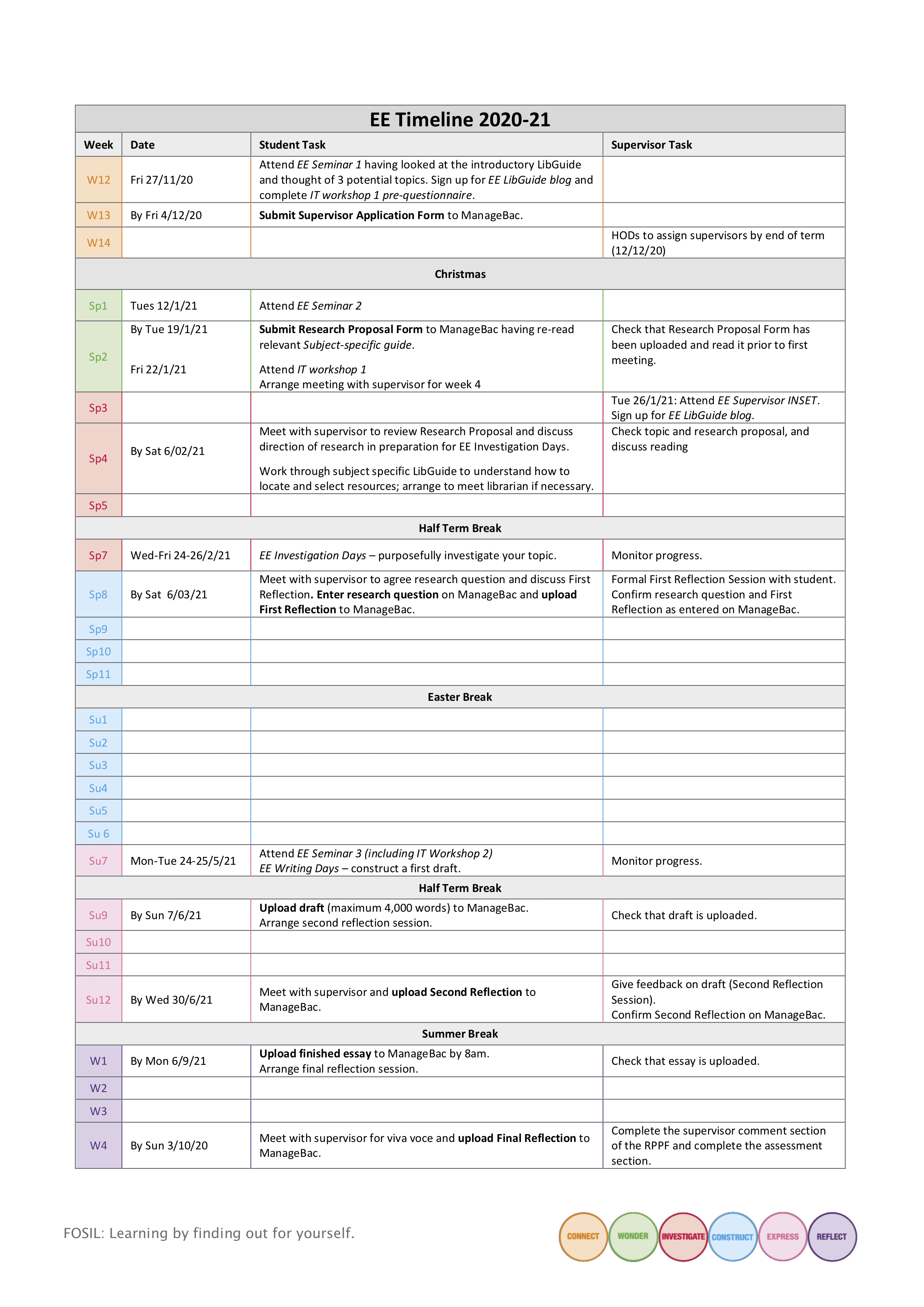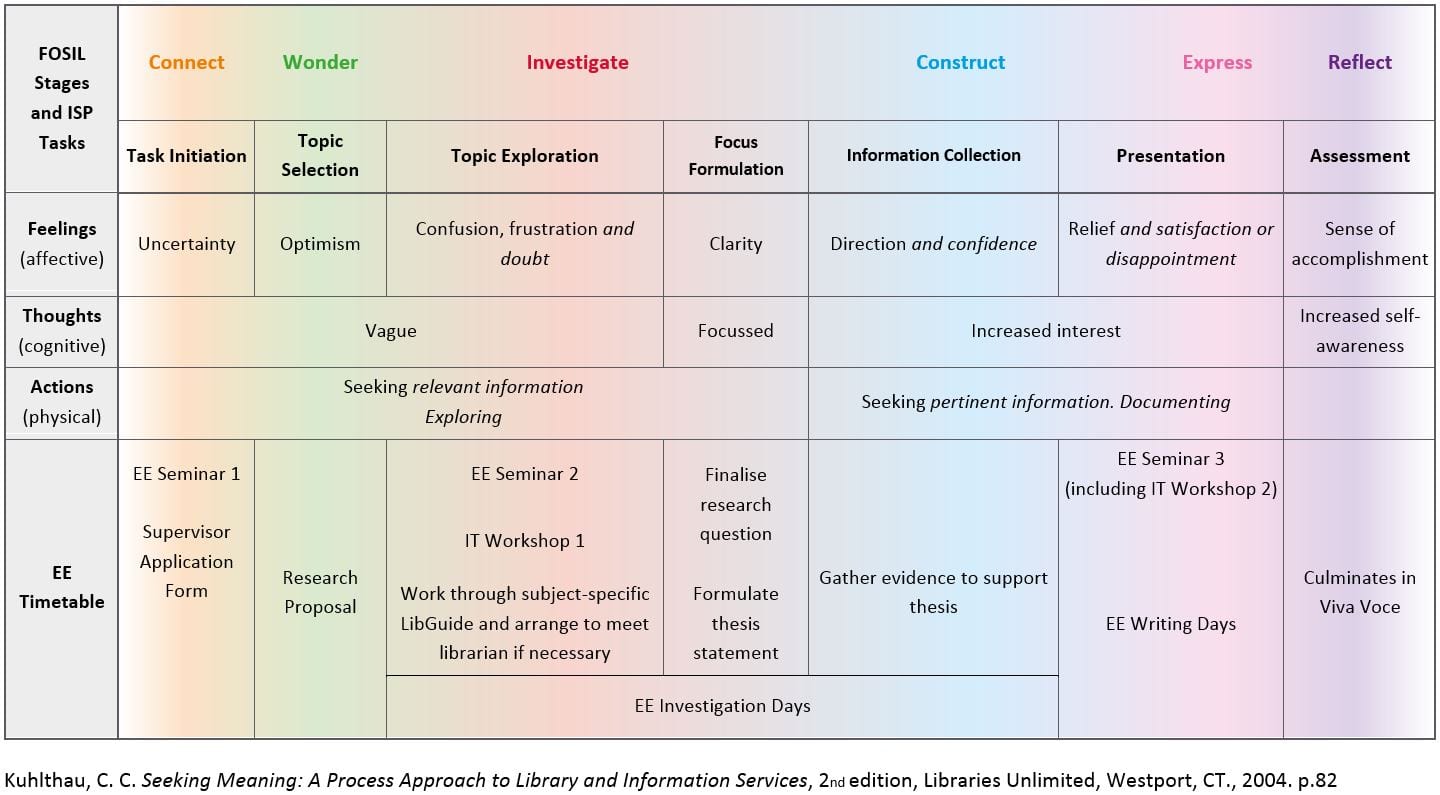Reply To: FOSIL and the IB Diploma Programme Extended Essay (EE)
Home › Forums › Inquiry and resource design › FOSIL and the IB Diploma Programme Extended Essay (EE) › Reply To: FOSIL and the IB Diploma Programme Extended Essay (EE)
Basic support outline
This is an outline of what the Library, in conjunction with, Chris Foster, our Head of Student Research (a hugely important collaboration which I will elaborate on in a future post) offers, which has been developed over many years:
- 3 seminars for the whole cohort at critical intervention points
- two near the start of the process to introduce the idea of the essay and the formal requirements, to help students to select a suitable topic and for them to learn how to investigate that topic effectively and efficiently, using all the resources at their disposal appropriately, and
- one just before the Writing Days to explain the formal presentation requirements and remind them about citing and referencing
- 2 IT workshops
- one just before the Investigation Days to teach them how to use the citing and referencing tools embedded in Word and the Investigative Journal, and
- one just before the Writing Days to show them how to set up their document using features like contents lists, headers and footers and page breaks, and how to transfer their citations from their Investigative Journal to their essay.
- 2 off-timetable periods
- three Investigation Days in February to jump-start the reading process and give students time to immerse themselves in their topics, and
- two Writing Days in May to give them concentrated time to write up their findings before submitting their first draft to their supervisors. Both of these periods happen in the Library (unless they are doing a practical subject and need to be, for example, in the Science labs, Art studios or DT workshops) so they are surrounded by the resources they need and have easy access to support.
- Some sort of subject-specific resourcing support (alongside that offered by their individual subject Supervisor). This has evolved over the years from individual reference interviews when the cohort was smaller and we were less involved in inquiry across the whole school, to compulsory subject specific seminars for small groups of students doing their EEs in similar subjects, to point-of-need provision with detailed subject support available in online guides, supported by drop-in sessions during the Investigation and Writing Days and the option to meet with me individually if they need specific support.
- A range of FOSIL resources. The investigative journal, which we now use very widely, was originally developed for the EE, but there are also a number of very specific resources developed to support the process.
- We also run Supervisor INSET every year, just after supervisors have been assigned. This is both to support new supervisors in developing an understanding of the process, their role in it and the additional support the Library provides, but also to update experienced supervisors on any changes in the rules and in the support we provide and advice we give. Anyone is welcome, all supervisors are expected to attend, and HODs are encouraged to come even if not supervising that year.
This is our current EE timetable:

And this is our attempt to explain how it links with both FOSIL and Kuhlthau’s Information Search Process:

Although this may seem like quite a lot of support for just one component of the DP, the skills that students learn during this process are vital both for other subject based coursework they will complete during the two year course and for subsequent university studies. Many post-DP students who have been in touch with us have remarked how much better prepared they felt for university studies because of the skills they learnt during the EE. This is also, to an extent, our ‘space program’ (see “What’s your space program(me)?” in the Effecting change forum). Because it is such a long, in-depth inquiry with an entire cohort of students across all subjects, that is guaranteed to be repeated every year, many of the resources we create and insights we have can easily be repurposed in other areas and trickle down throughout the whole school, and across into A-level courses.
I am planning to outline below how our support has developed over the last two years since I became Upper School Curriculum Librarian, and what I have learnt in the process (I am less qualified to comment before that!).


